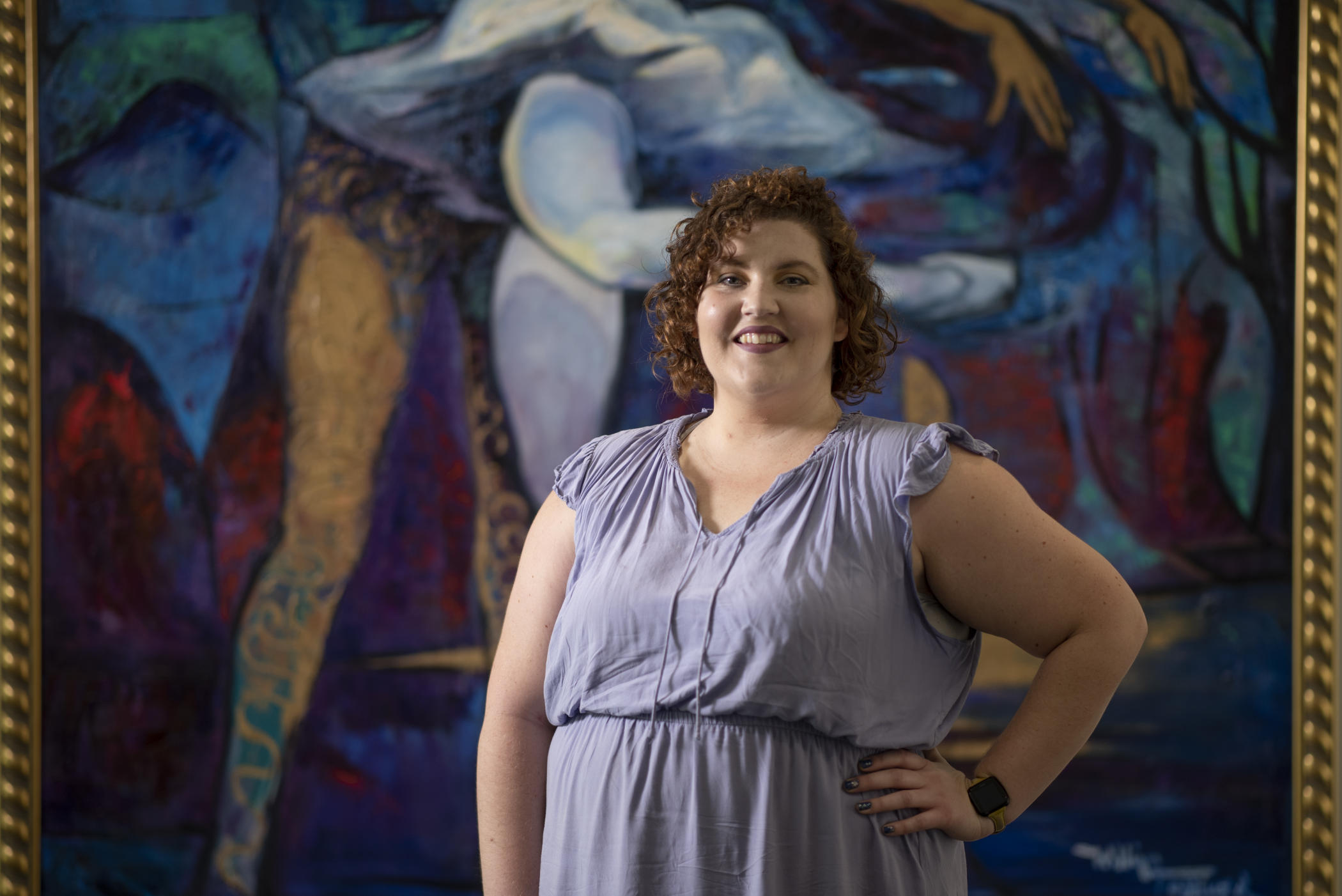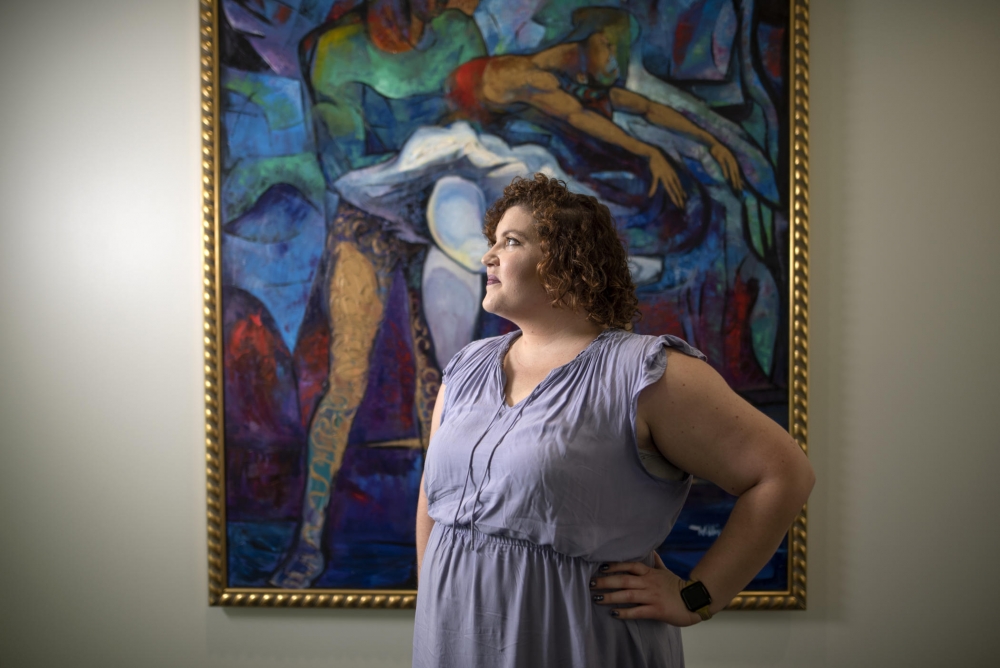Perseverance Drives CSU Trustees’ Award Winner to Excel

Cory Tondreau is photographed on Thursday, September 12, 2019 in Chico, Calif. Cory is a grad student in psychological science and is the CSU Trustee winner. She has overcome a lifetime of obstacles to earn her undergraduate degree and now seeks her masterÕs and then PhD. (Jessica Bartlett/University Photographer/CSU Chico)
Click-click. Click-click. Click-click.
Cory Tondreau’s classmates snickered as she absently hammered her thumb on her pen, her teachers frequently unable to capture her attention as her mind drifted during class. She struggled in grade school, never able to give undivided focus to any subject. When she brought home report cards, which were average at best, her parents—neither of whom graduated from high school—were unconcerned by teachers’ remarks citing inattentiveness or a tendency to daydream.
Tondreau (Psychology, ’16), now in the fourth year of the psychological sciences master’s program, retrospectively realizes her attention deficit/hyperactivity disorder (ADHD) was obvious, even that early. She laughs as she pantomimes a rapid-fire pen thumbing again—click, click, click—just one example of her hyperactive tendencies. Not until 2018, at 28 years old, did she receive a diagnosis.
But Tondreau has never been satisfied to accept adverse circumstances. Through a lifetime of obstacles including poverty, discrimination, and abuse, she has persevered, seeking to learn from her experience and better the world around her. That drive and tenacity—and resulting success—are major reasons Tondreau, an honors student and psychological sciences standout, has earned the 2019 California State University Trustees’ Award, a systemwide honor given to students demonstrating superior academic performance, personal accomplishments, community service, and financial need.
“That’s the way I’ve dealt with things. I just push my way through them,” Tondreau says. “I don’t accept situations I don’t like.”
Those began at home, in Southern California’s Antelope Valley. Whether it was her mother’s screaming or her father punching holes in the wall in drunken fits of anger, Tondreau’s childhood offered few areas of refuge. She has countless memories of hiding in closets with her sisters while her parents fought. They were young—her mother 16 and father 18 when they married, with the first of three children coming just a year later—and they always struggled to make ends meet. Money was almost always the topic that sparked their battles.
“It was a toxic household, and they didn’t realize it,” Tondreau says. “Watching them fight played a role in my mental health. You live with it and try to avoid conflict. But for a long time, I didn’t realize how it created this bed that made me seek out people who weren’t good for me.”

Home life was the starting point of a spiral of suffering and abuse for Tondreau, who began identifying as queer in 10th grade and immediately experienced homophobic friction from her parents, especially her father. Her first significant romantic partner sexually assaulted her, which she didn’t even recognize as abuse until years later. Now 29, she’s able to contextualize some of the discomfort she felt in the relationship. She also notes that period in her life as a definitive turning point.
Unhappy in a manipulative relationship and on academic probation at community college after two semesters of failing grades, she found herself daydreaming again—at home, not working, with no future prospects. That’s when, in a rare moment of clarity, she decided to make a change.
Click.
“’What am I doing? What am I going to do with my life?’” Tondreau demanded of herself. “I didn’t want to sit at home or work a job I don’t like. That’s when I said, ‘OK, I’m going to go back and I’m going to work as hard as I can.’”
She thought critically about the world around her: the long hours her dad worked and the directionless days her mom spent at home; her aunt’s schizophrenia and bipolarity; her grandmother’s anxiety and depression. How did her family get to be this way? How could she help? As she made frequent visits to her hometown’s LGBTQ+ center and spoke to her advisor there, she noted how his therapist’s background and expertise allowed him to help people effectively. That relationship cracked the door to her passion for psychology, and this time around, she was ready. Her research of state colleges led her to Chico State, which offered hands-on research opportunities, an honors psychology program, and a starkly different environment than the desert climate of Antelope Valley.
“When I visited, I saw trees!” Tondreau recalls with a laugh. “The environment was amazing. Between the feel here and what the psychology department had to offer, I knew this was the place for me.”
She arrived at Chico State inspired. That self-motivation fueled her through her undergraduate studies, and she graduated with honors. But her educational aspirations were higher, and she enrolled in the master’s program. She excelled in two research labs her first semester as a graduate student, then was asked to be the lab coordinator for professor emeritus Neil Schwartz’s Learning Cognition and Instruction Research Laboratory. For summer 2017, she was granted a prestigious research fellowship in Germany at Technische Universität Dresden. She has maintained a 3.9 GPA while furthering her research in cognition, learning, and instruction, and serving as a mentor and advocate for her peers.
Tondreau ultimately plans to pursue a PhD in educational psychology so she can become a researcher and professor who helps students like her pursue their educational dreams.
“Cory has morphed into this unbelievable woman who finally believes in her potential and what she can do, and she’s gotten so confident in her quest to be a social scientist,” Schwartz says. “It’s been unbelievably gratifying. I’m just astonished at her critical thinking, her reasoning, and how she’s grown in those areas.”
Tondreau’s graduate research work examines knowledge and attitude change, specifically about social issues. Her own experiences and struggles fuel her desire to learn in the areas of justice and equality, to examine solutions, and help others seek understanding. Though she’s passionate about her studies, that’s not to say they come easily to her—and that’s what makes her special, Schwartz says.
“I have a reputation for being one of the toughest professors in that department—I’m not always nice!” Schwartz says, laughing. “But who others might find intimidating, she finds an opportunity where she believes she can grow. I’ve given her a lot of feedback that was quite tough, sometimes pretty brutal, and she never flinched. She has unbelievable tenacity. She’s in the 1 percent when it comes to having that quality.”

Tondreau was taking on high-difficulty lab assignments, and neither she nor Schwartz could pin down why, every so often, she would simply fail to turn things in on time. In one instance, Schwartz recalls, he snapped that he could no longer waste time with her if she could not show progress in her research at their scheduled meetings.
She kept scheduling office hours—and she continued working with her therapist, who diagnosed her with ADHD.
In the year since she received her diagnosis and a prescription to help alleviate its effects on her mind, Tondreau began to feel like she’d unlocked a new level of learning. The quality of her work skyrocketed. She could more deeply understand complex concepts, and with more ease. She’d finally found the missing key—proper medication and regular therapy—and the final tumblers moved into place.
Click.
Tondreau does lament what she might have learned in years past had she been diagnosed earlier. But she acknowledges she’s also learned a resolve and resiliency that helped guide her path, and as she readies for new professional and educational experiences to challenge her, she certainly is prepared to take on obstacles the way she knows best.
She’ll push her way through them.
“The simplest way to talk about Cory is that she refuses to be defeated,” Schwartz says. “Her work on herself really has allowed her to stand out and show off the light she has inside.”


